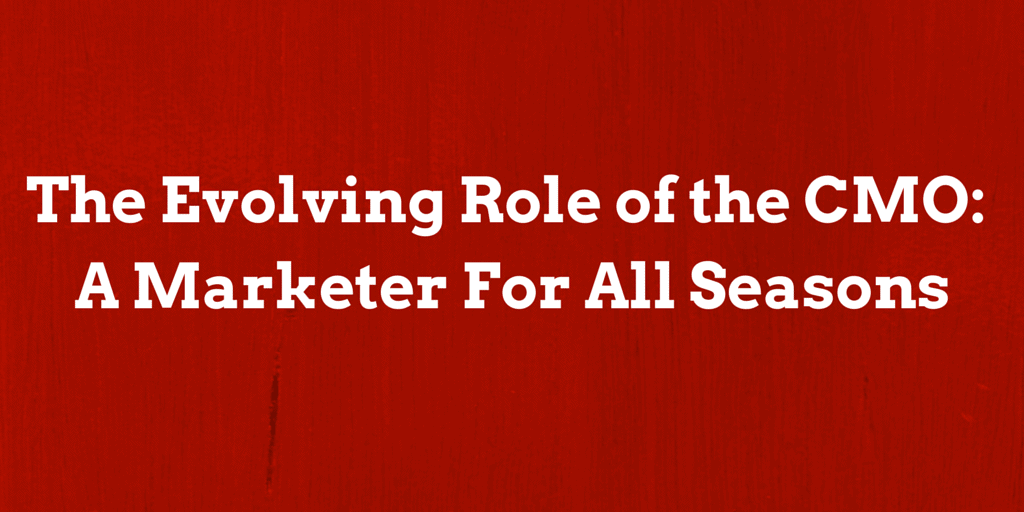A highly effective CMO possesses an imperative skill: the ability to anticipate and communicate the parameters of business in the context of consumer demands and expectations.
In other words, to predict the future.
Luckily, this is easier than it sounds.
A Classic Two-Pronged Attack
You don’t need a crystal ball to plan your marketing meta-strategy, but you do need to comprehend the fact that it will operate on two separate, distinct, parallel realities: the reality of marketing and the reality of CEO expectations (you know, ROI).
These realities are related through you, the CMO. Because both are important but often veer off in diametrically opposed vectors of development and actionable goals, you need to approach each one with clarity and precision. If you don’t have your finger on the pulse of your marketing efforts and CEO’s demands, your process and then your reporting becomes fuzzy. And before you know it, you’re spouting waffle about followers and Facebook.
Marketing’s Multiplicity
The truth about marketing is the fact that it has splintered into multiple niche competencies. The old-fashioned age of the all-purpose advertising executive is no longer a breathing being: the static trinity of radio, television, and print is simply not the universe of communication with consumers.
The CMO For All Seasons
The modern CMO must be strategic in executing marketing endeavors. No duh, you say. But here’s the rub: you need to direct what media to employ, and then ensure the maximum expertise carries this endeavor forward with measurable and reportable results. The unvarnished truth is this means outsourcing projects to optimize the advantages of competencies. Knowing when to do this and how to do this and then making sure this is done well is a hefty task. Add that there needs to be communication across media (especially when outsourcing is involved) to ensure goal alignment and anyone can grasp the complexity of a modern, effective marking campaign.
Bottom line: every marking endeavor must be optimized for its niche competency. For most CMOs that involves some degree of outsourcing: marketing media continue to proliferate as digital communication transforms how a business communicates with consumers.
Digital Business
Of all the permutations marketing has experienced in the last twenty years, undeniably a core niche to focus resources on is digital marketing. The reasons for this have extension far beyond online sales. Business is on the cusp of a major transformation:
Digital business is the creation of new business designs by blurring the digital and physical worlds. Digital business promises to usher in an unprecedented convergence of people, business, and things that disrupts existing business models.
With more than seven billion people and businesses, and at least 35 billion devices, communicating, transacting, and even negotiating with each other, a new world comes into being — the world of digital business.[1]
As companies are gathered into this new business space, attrition will be measured by success or failure in the realm of information. And it’s going to be the CMO that drives the entry into the business frontier, using social media to capture data about customer activity, lifestyles, and preferences. The future of marketing will revolve around the exquisite refinement of customer engagement, tailored to their unique needs.
Reporting The Results
This is where the rubber meets the road. Having sound channels of communication with CFOs and CEOs is the shelf your position rests upon. Nowhere in business is it truer than in marketing that the quality of what you communicate determines if those channels are strong – or collapse. Gaining your CEO’s trust and nurturing it can be harder than you think.
As a marketer, you’re constantly marketing out to the customer, and marketing into major stakeholders.
In both cases your strength is information. When reporting, don’t swamp your audience with the minutia of social media activity. Instead, align your reporting with the specific goals you have set. And be upfront: not all of marketing’s critical activities have an immediate, quantifiable relation to ROI.
This is where a lot of us start to sweat. Here’s why.
Stragglers In The Digital Landscape
As hard as it is to believe, there are still senior corporate managers out there who have not grasped the extent and impact of the online revolution. Thinking that this just means sales transacted digitally, they miss the much greater importance of the radical shifts taking place among consumers. They’re frozen in the dotcom era.
Educate To Achieve Alignment Of Goals
Articulating the realities of the marketplace is a major occupation of the modern CMO – of greater importance than ever before in a climate of ongoing change and adaptation. Consumers are no longer passive – they want to communicate with business and are careful to research companies and products before they make purchases. Trust comes from a variety of media activity, and they expect more from business than just cold, hard mercantile exchange – there is an emotive aspect to their brand loyalty.
The modern consumer comes to the table well informed about a company. The CMO needs to ensure the company at that same table is as well informed about that consumer’s likes and dislikes. It’s no surprise that many companies are turning to a CCO – chief customer officer – as the touchstone for a critical aspect of sales.
Anticipate Areas Of Disconnect
It’s best to take the biggest areas of CEO confidence head on. You need to unhook social media’s role in the mind of senior executives from direct sales. Sure, there is still influence exerted toward sales figures, but the evolving role of social media for larger rather than small and start-up companies is the generation and exchange of content with consumers to satisfy their expectations and make their research of your products and services easier AND to capture information about their preferences.
Social media is in part controlling the nuances of the contexts that surround and support the sales act. It does this by:
- Ensuring reputation: brand credibility is the sine qua non.
- Placing products in a favorable position – that means helping consumers research products in a way that helps the process flow toward a purchase
- Yielding feedback about what customers like and don’t like in order to
- Find potential consumers to market to them
- Produce or refine products/services to meet actual, real-time demand
All of this fuels customer service and satisfaction, which is how the activity contributes to ROI. As digital business becomes the common market space of a global economy, the value of this activity will increase from enterprise enhancement to everyday enterprise reality.
If you’re looking for a path into the digital landscape, Zen Media has the expertise to craft strategy that helps you connect with consumers. From social media and SEO to the kind of engaging content you need to connect with today’s discerning customer, Zen Media can help optimize your online marketing endeavor.
[1] Source: http://www.gartner.com/technology/research/digital-business/









